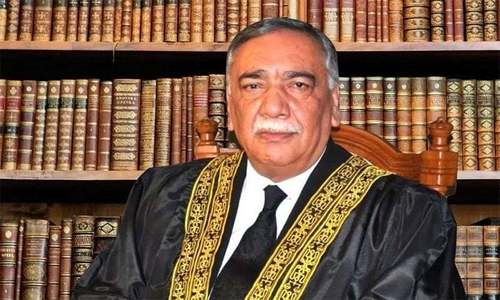WHAT constitutes terrorism? The Supreme Court on Wednesday provided much-needed clarity on the answer to what has proved to be a conundrum even for many legal experts in this country.
Read: 'Terrorism' too widely defined in Anti Terrorism Act, says SC; recommends Parliament bring changes
In a 59-page judgement authored by Chief Justice Asif Saeed Khosa, the seven-member bench not only held the definition of ‘terrorism’ in the Anti Terrorism Act as being overly broad — something that has repeatedly been pointed out — but also that the courts have not always interpreted the ATA correctly.
In fact, the verdict acknowledges that through the course of the various amendments to the law, parliament has arrived at a definition close to the international perception of terrorism. That is, it is “a species quite distinct from all other usual and private crimes howsoever heinous or gruesomely executed”.
The verdict says that as per the ATA in its present iteration, terrorism is a “crime with the object and purpose of destabilising society or the government with a view to achieving objectives which are political in the extended sense of the word”. Thus the motive, or mens rea, rather than the fallout or potential fallout, is critical to determining whether an act constitutes terrorism.
The verdict directs the courts, including the superior courts in their appellate jurisdiction, to revisit their interpretation in which “the shifting of focus from the effect of the action to the design or purpose behind the action had not been noticed”.
The Supreme Court verdict has also rightly held the preamble to the ATA as being problematic because besides providing for “the prevention of terrorism, sectarian violence” it broadens the scope of legislation to include the “speedy trial of heinous offences”.
A number of crimes — including extortion and kidnapping for ransom — mentioned in the Third Schedule appended to the ATA are listed as falling within the scope of the legislation, without any qualification regarding the motive as arising from a personal desire for profit or vengeance. That has made the ATA inherently self-contradictory and, predictably enough, led to anti-terrorism courts being choked with crimes that have nothing to do with terrorism as defined in the law. Instead of facilitating the prosecution of terrorism, the ATA’s flawed drafting has caused further delays in the disposal of cases that are clearly in furtherance of political and ideological motives.
In a matter of a few weeks, the Supreme Court has given two significant verdicts pertaining to antiterrorism legislation. The first laid down procedural guidelines in trials conducted by the ATCs: among them was that terrorism offences remain non-compoundable even if the aggrieved party pardons the perpetrator for compoundable crimes simultaneously committed during the act of terrorism. Taken together, both judgements have rationalised a critical component of the criminal justice system, and highlighted where work needs to be done.
Now parliament must act on the apex court’s directions to prune the ATA.
Published in Dawn, November 3rd, 2019














































